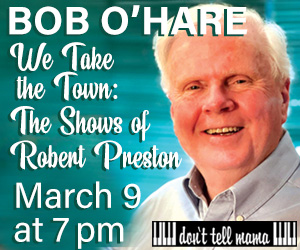Theater Review by Walter Murphy . . .
Café Utopia, produced by the Notch Theater Company and now playing at the Hudson Guild through November 23, is a comedy about how the perceptions of unions and the value of work has changed. It is entertaining and insightful. It also breaks with form to ask the audience to be part of the play. Art as a force for change.
Set in one location of a large chain, Café Utopia presents work issues facing five workers and raises the question of whether unionizing will improve their conditions. Among other important issues, it illustrates how newer corporations like Starbucks or Amazon are very different from a more traditional company. As the Café Utopia manager points out “We’re not big coal.” Dangers may be less severe while serving beverages, but the management attitude is old school: we are in control.

Playwright Genevieve Kingston deftly constructs staff stories to represent the frustrations across their working experiences: a newbie, a mid-career worker, a veteran of 10+ years, and an original employee of the chain. Such differentiation helps demonstrate each worker’s relationship with their job, from the necessity of paying bills to believing that the company cares about them.
Café Utopia was founded by “the youngest billionaire” with the best of intentions: To create a product that makes customers better versions of themselves. By extension, those customers would share their better selves and inspire others, producing a better world. “Our Mission is to heal, build our culture, nourish, and uplift our customers and communities, one drink at a time. Here at Café Utopia every customer and order is unique. We treat everyone with the same radical respect regardless of gender identity, religion, or race.” Quite the mission statement.
However, trouble brews in the coffee shop. The workers are conflicted. The longer a worker stays with the company, the more they feel secure and comfortable with management, while newer employees struggle to understand how to get to that level of security. When questioned, management offers a hands-in-the-air response: Sorry, those are the rules.

Limiting work hours to prevent healthcare coverage, being asked/expected to go the extra mile for the company due to system/machine breakdowns, and threatened loss of jobs/closing of locations due to union organizing activities are examples of union busting and employee exploitation. Meanwhile, management hides behind “The Rules.”
The founder, a mysterious fellow, explains “I thought I was making a different kind of company: benefits for all workers, profit sharing, net-zero carbon emissions. But I was 25 and an idiot.” Sadly, “I surrounded myself with people who knew how to run a business.” And running a business does not include unions, in his estimation. That wasn’t always the case.
Unions used to be a big part of the US economy. (Full disclosure, I am the child of two union members.) Now, as a result of management shenanigans like legal actions, lobbying, and political willfulness (e.g. Reagan firing PATCO air traffic controllers), unions struggle to remain relevant. Not surprising. What Café Utopia demonstrates is that worker abuse still exists and the laws that are meant to prevent it are ineffective.

At times, Café Utopia felt like a union organizing event couched in a play about workers in an upscale coffee shop. However, there are laughs and running gags. Menu items spoof new age conceits: “If I wanted to feel more grounded and resilient I might order the Wheat Grassroots Community Uprising Blend.” Or “Existential dread. Ok, I’m going to suggest our Banishing the Bluesberries Shaken Iced Tea.” One worker, Enzo, always seems to be at work, yet one is never quite sure where he is.
The cast projects an earnestness in the work. Sergio Mauritz Ang, Julia Atwood, Kathleen Mary Carthy, Al Piper, and Louis Reyes McWilliams are all union members, deeply engaged in their roles. Their stories reveal many of the real concerns of workers struggling to get on with their lives.
I was a bit surprised when the play paused and the actors broke character and the fourth wall to ask audience members about their experiences with unions. Although I didn’t agree with this approach initially, it did foster the sharing of experiences. Therefore, each subsequent performance will be unique given this improvisational audience participation. Seamlessly, the play resumed. I was ultimately won over by Ashley Olive Teague’s unexpected yet effective directorial choice.
Café Utopia. Through November 23 at the Hudson Guild Theatre (441 West 26th Street, between Eighth and Ninth Avenues). www.notchtheatre.weebly.com/ Caféutopia
Photos: John Keon

